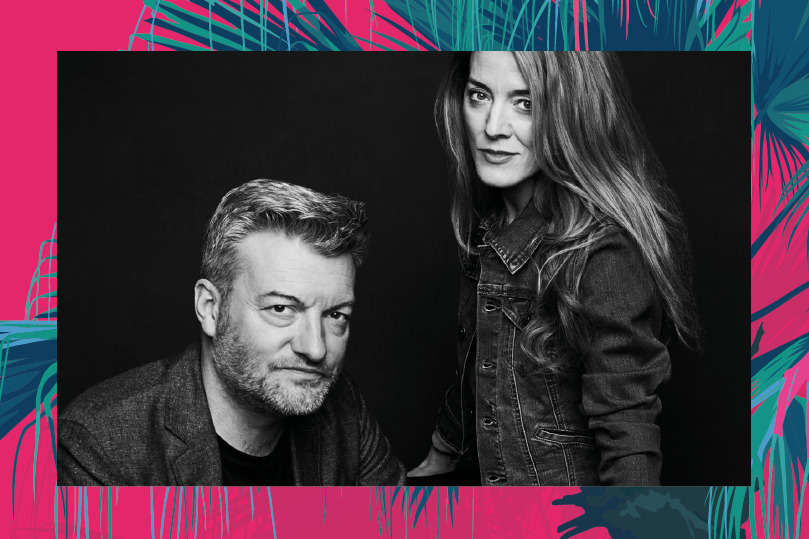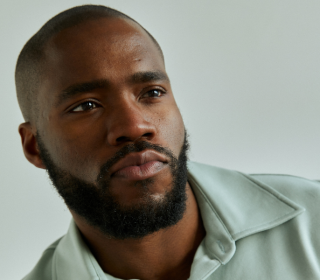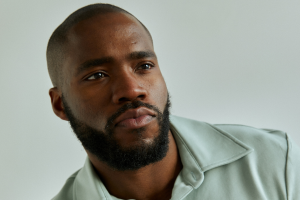Charlie Brooker and Annabel Jones on pursuing hope in the technology age

The lightning bolt of inspiration has just struck Charlie Brooker while he’s mid-flow with Balance and his producing partner, Annabel Jones, in a London hotel. “I’ve just had an idea for an episode, so I’ll shut up!”
The fifth season of anthology series Black Mirror has just landed on Netflix, and Balance may have just witnessed the exact moment Brooker had an idea for season six. It’s exciting.
We’re enjoying a wonderfully freewheeling chat about technology, the future and all things Black Mirror. Brooker and Jones, the double act responsible for the Netflix smash, are talking passionately about ways of combating tech use when Brooker has his lightbulb moment. His eyes widen. It was quite a thing to witness, the moment inspiration ignites.
Balance has admitted to using its smartphone too much, and Brooker suggests a device called a Kitchen Safe, a transparent box with a timer, to combat it. “You put something in it,” he says, “set your timer for a minute or a month and it locks it. And you cannot get it out.”
“Why can’t you just do that on the phone?” reasons Jones. “Why can’t you just set the phone to not turn on?”
Chatting with Jones and Brooker is like spending time with siblings; they join in with each other’s answers, occasionally bicker in the warmest way possible and are clearly incredibly close. It’s a partnership that’s spawned Emmys and BAFTAs, worldwide acclaim and hit shows such as Dead Set, the satirical Wipe series and, of course, Black Mirror.
Brooker parries: “You can. But it is well recognised that willpower is a difficult thing to sustain. You can always override a phone. The funny thing is… oh actually, I’ve just had an idea for an episode, so I’ll shut up.”
And, with that, Balance practically explodes with excitement (you can hear the moment on the latest podcast). Because technology is at the dark heart of Black Mirror, Balance has long been eager to chat with Brooker and Jones. After all, we all worry about technology and wellbeing and how we’re using our phone too much, right?
The negative impacts are well-known: posture, concentration and mental health can all be affected. When you try to kick the addiction, it can trigger withdrawal symptoms, anxiety and depression.
One new episode in particular, Smithereens, which stars a so-hot-right-now Andrew Scott, will dominate conversations given smartphones, and the sweet dopamine hit they provide, play a key role.
“Our job isn’t to tell people what to do or think,” reasons Brooker, who met Jones when making Channel 4’s 2008 zombie drama Dead Set. “We’re presenting a story with a hopefully interesting dilemma that’s exciting.”
He adds: “What is interesting is that I was at an event a few weeks ago where there were lots of tech people and Silicon Valley-type folk. And the topic of conversation was the unseen ethical ramifications of the very things they were developing.
CAUGHT IN THE MOMENT
“It was something they were worried about. The unforeseen consequences of something is a real problem for them to grapple with, and it’s something the world is grappling with at the moment. But I wouldn’t profess to know the solution.
“When writing the episode it was at a time when I was trying to concentrate and I felt like my attention was being shattered. I had an app called Moment which tracks your phone usage and it was immediately terrifying. No matter how much time you think you spend using your phone, you probably spend three times that amount.
It would tell you you’re spending this much time on Twitter, email or Facebook and it was horrifying. Like being told you smoke 120 cigarettes a day. So I turned my phone screen to monochrome, which was a thing I’d read about, and then that got irritating after a couple of days.
“Author Douglas Adams once said that in the olden days, writers used to look out of the window when they should be writing. Now the internet exists, the thing you’re writing on is the same place where the window exists and it’s a real problem.
“As soon as I cut off my internet connection, I’d start Googling things on my phone and use 4G. It’s like trying to stop the flow of water: it just goes around the rock.”
Jones says: “Andrew Scott” [she pauses to pray, alluding to Scott’s remarkable performance] “plays it as he always does: small, intense, personal, passionate. And you follow his story. We also want to make a wider point about how this world has been created, how this phone is so seductive and what’s behind all of that.
“There is something deliciously ironic that the phone that’s been designed and created to hold your attention for as long as possible is now being designed to warn you. It’s evolving itself in terms of design and a worry about backlash. It’s becoming ethical. It all evolves.”
Brooker then goes on a characteristically hilarious ‘rant’, the sort made famous via another Jones and Brooker hit, the satirical BBC Two Wipe series.
“Smithereens is risky for us as a show because what you don’t want to be perceived as is people going: [Brooker adopts the voice of a gruff older person], ‘You young people, you whippersnappers! You’re spending too much time looking at your iPads and your phones and your screens! Go on! Climb a tree! Scuff your knees up! Go on! Eat an orange! Touch some wood, you f*cker!’ We’re not trying to say that. There is a difference between that and pointing out that a lot of these products are optimised to keep people hooked. That is true and has ramifications.”
“The ingredients of the drug are changing and you’re not even aware of it,” Jones explains. “One day you wake up and get a number of how many emails you haven’t looked at yet. It becomes like a game: ‘I’ve got four and have to get that down.’ Those subtle things draw you in and pull you back.”
Brooker agrees. “Every app on your phone is competing for your attention. It’s like a nest full of baby birds for you to f*cking throw up in. Of course it’s a box of f*cking madness.”
Part of the reason behind Black Mirror’s success is that it’s believable. OK, you can’t inject a camera into your child’s head as you can in the haunting Arkangel. But, you can imagine it happening in the future. Any protective parent possibly watched and secretly thought, ‘What a good idea…’
“One of the defining things we always look for is something that is going to seduce you,” Jones reveals. “Something that is beneficial and you would welcome into your home. Because if you don’t, then there’s no credibility in the world, and I’m like, ‘Well, that wouldn’t happen,’ and you disengage.”
If you’re a creative type reading this, it might be an idea to find a pal with whom you can enjoy stimulating, and possibly even mildly combative, conversation in order to bring the best out of each other. Brooker believes the concept of Arkangel came about when Jones teased him for buying a baby monitor that can sense movement.
LET ME SELL YOU A STORY…
“The concepts aren’t necessarily the tricky part. You want it to just be a human story at the heart that’s in a particular world. Then there’s a leap of faith in terms of the concept; often it’s not even a leap. And then it’s, ‘What’s the compelling story?” says Jones.
Brooker adds “The trickier part is often, ‘Where’s the story?’ You have to hone in.”
One of the most compelling stories was the ground-breaking Bandersnatch, the stunning interactive episode that enabled users to decide the character’s fate. However, the dark side of social media reared its head and star Will Poulter, regarded as one of the sweetest souls imaginable, stepped away from Twitter. The moment felt symbolic of where the medium is right now. A few years ago, it felt like a warm and supportive environment. Now it feels corrosive.
“He’s a private individual and had never had that level of interest in his life before and I think he found that uncomfortable,” reasons
Jones. “Everyone has to manage their own relationships; some people would not be fazed by that at all and would welcome it. Some don’t. So much of Black Mirror is about finding your own level of relationship with which you’re comfortable with tech.”
“Social media often has the feel of a pub at closing time,” says Brooker. “It could go either way. Either people going, ‘You’re the best mate I’ve ever had.’ Or they’re glassing each other. And increasingly they’re glassing each other. There’s a lot of anger. It can’t sustain. People will get sick of it.”
“Or you’ll just go to a different pub,” counters Jones.
“Twitter used to be Stephen Fry saying what he had for breakfast,” says Brooker. “And now it’s, ‘Oh my god, a Russian disinformation bot is tweeting alt-right memes at me and everyone is calling me a b*stard.’ I suspect there’ll be regression to the mean.”
You could be forgiven for assuming Brooker and Jones believe humanity is doomed and that robots will destroy us all. After all, Black Mirror can get dark. Very dark. Yet there are memorable exceptions.
Both season three’s Nosedive and season 4’s USS Callister end on a positive note, and so Balance wonders if they think there is hope when it comes to the future and technology. It’s a big yes.
Brooker says “We’re not anti-tech. There are addictive qualities, but if you look at social media, it is an amazing tool and has given people powerful communication in a way that didn’t exist; it’s just that we’re grappling with the ramifications of that.
“Speaking more broadly, there could be solutions that mitigate climate change. If we get electric planes and extract carbon from the atmosphere and work out high-tech means of rewilding, we can slow down that. With technology, there are medical treatments that didn’t exist a few years ago.
There are technical solutions to all sorts of things, but there are also downsides and side effects to it all. But there absolutely is hope.”
WIPE THE SLATE CLEAN
Jones points out: “For all the Russian infiltration into the US elections, the flipside is that lots of voices are being mobilised and creating movements. That will drive change more effectively than we’ve ever seen in our lifetime and that’s incredibly positive. Whether it’s #MeToo, the vegan movement or climate change, that’s all powerful stuff . I’m very positive.”
Some of Brooker and Jones’ biggest hits have been Weekly Wipe, News Wipe, Screen Wipe and the end-of-year Wipe and Balance asks if there’ll be more. There’s bad news and good news.
“No, I don’t think so,” says Brooker. “No, but… well… I can’t say anything because nothing may happen.”
Jones adds: “What he’s alluding to may not be what people want.”
“That’s not to say that I wouldn’t do one again!” Brooker continues, “But there won’t be one this year. It seems to be cathartic and therapeutic for people in many ways, but it’s the opposite for everyone working on it because we have to sit in a room and watch the news again. They are so difficult to make because it’s a long, concentrated period and I just can’t do that at the same time I’m doing this.”
Jones supports her partner’s take on the matter. “It’s a proper review of the year rather than a joke monologue about clips. It’s authored… People like it because it’s a reasoned summing-up, not just a joke-fest.”
Brooker concludes “So, there isn’t one this year but that isn’t to say there won’t ever be one again. I’m always nearly talking myself into doing one. But then remember I don’t have the time.”
Too many great double acts called time because they fought, fell out or simply drifted apart. With Jones and Brooker, you sense there’s much more to come. After all, you never know when inspiration might strike next.












